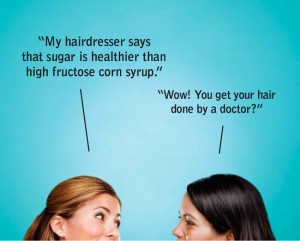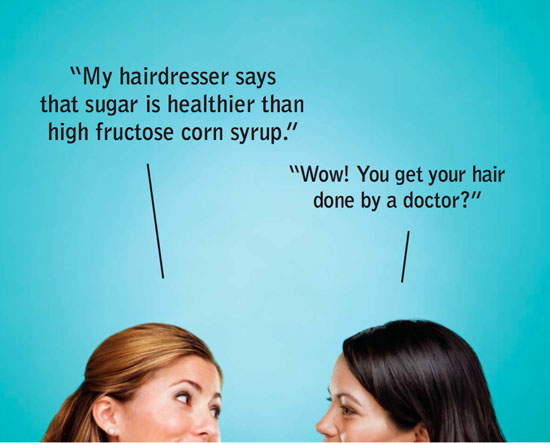
I’m not gonna lie – this is more for me than it is for you, dear reader, because I have a bad habit of running back to foods that are laden with high fructose corn syrup (HFCS) and usually don’t realize what I’m doing to myself until I’m halfway through the package. As if my mind says “Nooooo! Don’t look at the ingredients li– aww, damn.”
Conventional wisdom (and your brain) tells you, “if it feels good, do it.” Well, you know how sometimes, things feel a little too good? Like, so good, it’s downright sinful? Rest assured, you probably have no business doing it. My favorite piece of cheesecake? Sinful. My favorite Tira Mi Su? Sinful. The BBQ sauce I just tossed out the other day because I was clenching the bottle trying to understand why common sense wouldn’t let me put it down? Sinful! (By the way, all three of them contain HFCS.)
Having said all that, let me introduce you to HFCS. Actually, I’ll let the Corn Refiners Association do it:
Now… I laugh, only because I work in marketing. Ads like this serve one purpose: damage control. So when I see something like this, my first thought is “what happened to make the corn farmers toss money at the small screen?” They’re essentially mocking the very people they’re targeting — those who know it’s bad for them, but aren’t able to quickly express why — and still expecting to win them over. Or… is this a stealthy method of giving “comebacks” to HFCS fans to use when those hoity toity picky eaters get on their soapbox about Cheetos and Capri Suns? Who goes to those kinds of lengths when everything is ok? …when the accusations are baseless?
So… digging, I go.
First, let’s look at that ad up there. “My hair dresser says that sugar is healthier than high fructose corn syrup.” Follow that up with the witty retort of, “Wow! You get your hair done by a doctor?” [insert laughter]
You and I BOTH know that it doesn’t require an MD to be able to study and understand a pros and cons list. If I show you a list that says “fattening,” and another list that says “leaves you prone to diabetes, inflates your appetite, and apparently can be linked to high blood pressure,” you’re going to be able to easily identify which one is going to leave you worse off, right?

Well, let me tell y’all somethin’ – I’m no doctor, and I’ll still be damned if someone tells me that my own bad feelings aren’t enough to justify not wanting a chemistry experiment nourishing my body I was given. Period. You might get the mental judo chop for that one.
Let’s also talk about this moderation thing, here. Of course, HFCS is safe in moderation. At the same time, so are Doritos. The difference between the two is, well… do you know how many foods you eat each day contain HFCS? Let me put it to you like this: Soda? High Fructose Corn Syrup. “Processed Cheese Food?” HFCS. Jam, jelly, ketchup, BBQ sauce :(, “fruit juices,” Wonder bread (most breads, actually), eggos, pop tarts, cough syrup, and mayo? High Fructose Corn Syrup.Yes. Apparently, you have a better chance of escaping Doritos than you do HFCS.

Why is that, though? Why is it that you can’t escape this substance? In as few words as possible, here’s why.
Once upon a time, our government approved a plan that pretty much pays farmers to overproduce corn in America. Considering the basic principle of supply and demand (the more rare, the more expensive; the more common, the more cheap), that drives the price of corn down. Since they have this item in such abundance and so cheap, they come up with multiple ways to use it… hence HFCS. You, a food exec, have an extremely cheap item in your hands that makes food taste (or, at least appear to taste) better. Why not use this to your advantage? Stick some extra fat in certain foods to stretch out our supply… and when the taste is altered? Stick a little HFCS in there. Want to create a cheap juice? Find a “strawberry” flavor, some high fructose corn syrup, and water. Pow. Cost $0.50 to make, but watch me sell a giant jug of it for $2.50. I’m in there like swimwear. It’s just smart, business-wise.
Nutrition-wise, it’s doing nothing for you, the consumer. It’s empty calories. That means for all that you’re ingesting, there is no vitamin or nutritional value for any of it. At all. You should seek for all of your food to provide you a liiiiiiittle somethin’ in the end. Besides a gut, that is.
There’s one more point I want to bring up before I wrap this up… and that’s the point about rewards, gratification, and habit. HFCS tends to trigger a sort of… Pavlov’s dog syndrome, if you will.

Feels like I’m sticking you with a burden, right? That’s not my intention. I would love it if you could resolve a few things within yourself.
First, resolve that you’ll begin to phase out some of the unnecessary HFCS-filled foods in your life. If you overdo the mountain dew, consider packing it away… for good. If you love the ketchup or pancake syrups, look for something a little more natural. If you can’t afford the healthier option, shoot for a less expensive option. (In the case of the syrups, the healthier alternate that my grocery had cost an extra $4. So instead, I top my pancakes and french toast with a little confectioners sugar, $0.99, and fruit slices, $1.29. In the case of the ketchup, I simply stopped eating hot dogs… the one thing I couldn’t eat without ketchup.)
Then resolve that you’ve made the best decision for you, and no corny commercial or insulting advertisement will make you feel less comfortable with the decision you’ve made for yourself. Just like you don’t owe anyone any expanation for why you want to lose weight and eat healthier, you for damn sure don’t owe anyone any explanations for why you choose to phase High Fructose Corn Syrup out of your diet.
Lastly, like I’ve written before, resolve that this is a difficult lifestyle change — a lifetime lifestyle change and it will be bumpy at first. That’s perfectly okay. As long as you’re taking and following steps each day, you’ll be able to bet that you’re moving in the direction in which you need to go.
Be happy, be healthy! 🙂


37 comments
“a hormone in the human body that aids in regulating the appetite, in a way that prevents you from being able to control your hunger”
I really got lost there. I need to re read!
Damn you, Sis!
LOL Where’d you get lost, sis?
Leptin is a hormone in our body that aids in controlling our appetite. Somehow, HFCS manages to mess with it in a way that keeps it from doing its job. You get what I’m saying?
Not lost like that, lost in the words. Like I am kinda pissed…lmao
I had no idea how so serious…
Oh, in that case, yeah… it’s wild. The way the corn industry spins the information is phenomenal to me. No, it doesn’t “directly contribute to obesity” but how do we quantify “directly contribute?” Does it mean “eat HFCS, get fat as soon as the food digests?” Because if that’s their definition, then yes – they might be right. Otherwise, they’re full of it.
A chemical that’s in damn-near every dish we eat… ingest it in moderation. How do we quantify “moderation?” If it’s “don’t eat it at all… since it’ll prevent you from being able to gauge your own appetite… but we won’t tell you any of this and let you gauge it on your own,” then yeah. They may be right. Otherwise, they’re full of it.
Glad I could help, though. 🙂
Are you serious that HFCS messes with us like that! LORD NOOOOOOOOOO!!!!!!
FYI you can get organic ketchup w/o HFCS, enjoy your hotdogs! My roommate and I have been on a quest to keep our home HFCS free. This makes grocery shopping take a little longer (reading labels and such), and a little more expensive, but we feel like its for the best. I definitely eat a lot more “natural” foods, and if you’re looking for a juice option, go for the 100% juice, HFCS free as well. Love the blog!
Seasons Greetings,
I just found your website and love it already! Thank you for providing a comprehensive commentary on the dangers of HFCS. I have been researching the negative impact this product (can it really be called food?) for the last year and get angry every time I learn more about the dangers of HFCS.
Learning about this topic has gotten me into label reading at the grocery store and online which takes time but it is truly worth it.
Again love the blog and look forward to your posts in 2010.
p.s. I roll my eyes whenever those pro-HFCS commercials come on the air. Talk about insulting the consumer!
fYI….I meant ‘roll’ not ‘role’ :0)
THANKS FOR ALL THIS VERY VERY IMPORTANT INFORMATION…
Thank you so much for writing about this very important topic.
I think the corn refiner’s association really hurt itself with these deceptive commercials promoting HFCS – they have been extensively mocked online.
HFCS hasn’t even been in widespread use since the 90s ans the research in the area of health impacts of HFCS is really lacking. There’s issues about mercury, liver effects, blood sugar effects, etc. that seriously need to be explored.
It’s just kind of scary because so much stuff contains HFCS…
anyway – I just encourage everyone to eat as much natural food as possible; it’s food that’s been around for thousands of years and we know it’s safe.
All i can say is that Americans used to be way smaller before this corn syrup, it must really be a profitable business because the industry must know something is wrong with this filler in foods.
Very good post! You definitely did a lot of research on this, so awesome job. I’ll make sure to bookmark your blog as well!
There is nothing wrong with High fructose corn syrup. U can only become obese if u don’t have self control. If u have control then u should be fine. And if u exercise enough, then u will be in good condition, but if u have no control and u are too lazy to exercise, then u will get fat and/or obese. I am doing a project on High Fructose Corn Syrup and stuff like that.
Although i think that McDonalds should die! I’ve sen some1 being crried out of their cause their food gave them a heart attack. Don’t blame high fructose corn syrup for McDonalds fattyness.
Oh, and did u know that McDonalds lost a law suit to a women, who was suing them cause they were out of McNuggets… How sad. They also lost a law suit to a man who spilled the coffee he bought from them on his lap, he sued them cause the cup didn’t say, “CAUTION, MAY BE HOT”, and he won!
I hope i enlightened u. =)
Editors Note: @Davis,
No offense, but… you didn’t.
“Good condition” has to do with a hell of a lot more in regards to health than outward appearance, something which you focus heavily on. I’m not interested in just being skinny and fooling the masses into thinking I’m taking care of myself. Your comment smacks of the notion that a person who is “skinny” can eat whatever so long as they’re skinny. I reject that mentality in the interest of supporting better health on this site.
If you are doing a project on high fructose corn syrup, then you should research how the product is created, what nutritional value it offers the body, what value it offers the companies that create it and why the explosion of its use correlates so well with the explosion of obesity-linked illness in the United States.
I know this is radical thought, but obesity is not the entire “problem” – it is a symptom of a much larger problem, one that is shared by people fat and skinny alike. So all that talk about control and being too lazy to exercise… it’s not very productive nor is it conducive to what I’m offering here. I’ve written about what it means to be fit all over this site.
I can’t say, for sure, what the McDonalds cases have to do with my talking about the different versions of corn found in a simple McDonalds meal, but I AM aware that frivolous lawsuits exist. No one is recommending litigation, just making conscious consumers and helping people make better decisions about their eating habits.
I hope I’ve enlightened you. 🙂
Hey Erika, just started reading your blog and I’m loving it.
I thought I’d pass along a study Princeton recently did regarding high fructose corn syrup: http://www.princeton.edu/main/news/archive/S26/91/22K07/
The gist of it is, rats fed chow and a hfcs+water drink gained weight more rapidly than rats fed chow and a sucrose+water drink. More studies will need to be done to confirm and to narrow down the reason, but one theory expressed in the article is that, because the fructose and glucose in hfcs are unbound, the fructose is more readily absorbed by the body.
Anecdotally, I can only say I’ve felt much better since cutting out hfcs and I can quickly tell when I’ve eaten it. I get shaky and don’t feel full (and thanks to your blog post I better understand why). Having suffered through the hfcs commercials, I felt especially smug about my choices once I read that Princeton article 😉
You should! And thank you for posting the link here! (I caught the story, too – perhaps an updating to this article is in order? https://blackgirlsguidetoweightloss.com/what-are-you-eating/study-says-common-food-chemical-packs-on-belly-fat
It was only a matter of time before they figured this out, but either way… I’m glad the truth is coming out. Ironically enough, the CRA is STILL running those ads on TV. It’s like, “Oh, you figure NO ONE will notice that you’re wrong?” LOL I wonder if they’ve updated SweetSurprise to reflect the Princeton study.
Again, thanks! Hope you stick around! 🙂
Erika, thank you for your thoughtful article. In support of your comments, I have to say that this study done at Princeton is high quality work–I know this personally because the main author (Bart Hoebel) was my senior thesis advisor at Princeton and the first author (Miriam Bocarsly) and I did our senior independent work together…we spent lots of time griping about writing & drinking tea. She is meticulous and always is quick to question the meaning of her findings–whatever they are–and doesn’t jump to grandiose conclusions.
To those who are defending HCFS, read the paper by Bocarsly et al. and you can see exactly what they did, what variables they controlled for (ie calorie consumption) etc. The authors do not claim to be certain about all of the purported ill-effects of HCFS in humans; they just write about what they found in their rat population. And if people are still upset about it, they should really be upset with the reviewers who “let the paper be published”, because the journal they published in isn’t just some “oh I think I’ll post my results” journal…it’s called peer-reviewed for a reason. Ms. Bocarsly et al are simply reporting their studies’ results. I hope the group does more research 🙂
Finding foods that don’t use HFCS is much easier today than it has been in the past.
There are organic and HFCS ketchups now. Even a name brand ketchup such as Heinz now provides “natural” and organic alternatives.
Pancakes do nicely with a little maple syrup, and you don’t have to drench the cakes.
The number of organic jams, preserves, and spreads has exploded — and the HFCS variety are actually tastier. I use an organic red raspberry fruit spread that is addictive, and fewer calories than the sticky, gummy, HFCS variety.
The most difficult items were cooking items, such as liquid smoke and Worcestershire sauce. The US brands all have HFCS. However, Annie’s makes a good vegetarian variety, and there are several vegetarian recipes scattered about the web.
We’ve been HFCS free in our house now for over 6 months, and haven’t missed it a bit.
“Natural” is more of a red herring than anything else, because there is no actual official definition for the term. So while I take that with a grain of salt, I see what you’re saying, there.
I have noticed that more HFCS-free products are appearing on the market, but I honestly wouldn’t know about them because since I’ve written this post, I make all my stuff from scratch, lol.
Kudos on being HFCS-free, though! 🙂
Oops, sorry:
“There are organic and HFCS-free ketchups now.”
Hi Erika, wonderful blog and interesting read. However, I think this new HFCS paranoia is causing people to over look and not understand the real problem. Sadly, I gather the same misconception in this blog & please correct me if I’m wrong.
One major factor to insulin resistance & type II diabetes is large consumption of fructose. HFCS & all other simple sugars contain large quantities of it. (I tried to get exact ratios but its sounds like most are 1 part fructose: 1 part another compound.) And the same holds true for some versions of HFCS. So swapping any product for the sucrose or fructose version instead of HFCS will probably gain no benefit. (ie. soda with sugar ).
So why not write a rant about “Reasons to forgo food with added sugar!”?
BTW, I don’t want anyone to think this comment means to forgo eating fruit. Fruit is nutritionally dense unlike most processed food.
Thank you for coming by!
A quick glance across this site would show that I’ve written about clean eating, foregoing processed foods in their entirety and getting the biggest nutritional bang for your buck. So no, you’re absolutely correct… but since this post specifically covered the topic in the advertisements – shaming people who might not understand the specifics of high fructose corn syrup into believing that since they DON’T KNOW the specifics, they should just suck it up and eat the stuff anyway – that’s exactly what I covered. No harm, no foul, and you’re absolutely right. 🙂
Oh, and I’ve also written about the difference between getting sugar from fruit (that also comes with fiber to blunt the impact of the sugar on your system) and getting it from processed foods, as well. I will say this, though – there’s a point in here that I’d like to steal for my Q&A Wednesday, though. Hmmm. 🙂
https://blackgirlsguidetoweightloss.com/what-are-you-eating/qa-wednesday-high-fructose-corn-syrup-vs-table-sugar/
Hey Erika,
Thanks for the response. I only glanced at your other posts – so maybe I should poke a little longer. 🙂
My husband is a truck driver, he won’t eat anything with HFCS because he says that the tankers (yes tankers) that haul this stuff have to be replaced often because the stuff eats through the metal. Also, once the tanker has been used to haul HFCS it can’t be used to haul anything else…ever.
Omg that’s crazy! Yuck
Lord Help Me and MY JOURNEY!!!. I just found your site about a week ago. And i have been reading a few articles a day. And I really appreciate all the information. Reading all of this just makes my head and heart hurt. Child I have a sugar addiction that is OUT OF THIS WORLD. I recently started eating life savor mints…by the bag full. I can go thru the 41 oz Big Value in three days or less by myself. And whenever I try to stop I usually fail. This article is eye opening. Keep up the good work. I resolve to start to ween myself from sugar starting to day. I’ve been Pepsi free for about 7 months….now its time to give up the candy…then coffee.
HFCS is, at least in part, and unintended consequence of government meddling. The high tariffs on sucrose (cane and beet sugars) led to higher sugar prices. So, food processors looked for alternatives. And of course, as you point out, corn gets a subsidy . . .
Less regulation, more information.
Thanks for informing us.
love your site! Ive stopped eating everything with HFCS, aspartame, suralose, and any other crap that I cant pronounce! If I cant spell it, grow it, or hunt it im not putting it into my body! I use to LOVE lean cusines and smart ones tv dinners and I havent had one since August! Weight isnt coming off as fast b/c im close to my goal of 200lbs (currently 218.6!) but ims till losing inches and gaining muscle. Thanks so much for your site!
Foods that contains high fructose corn syrup should be avoided all together. Unlike like glucose, fructose metabolizes differently in the body. That said fructose metabolism behaves in a way that hinders your body to function properly and causing many negative effects that includes high blood pressure, obesity, diabetes etc. As an healthcare professional and a researcher in health and nutrition, I would recommend not consuming foods with HFCS. Foods high in HFCS includes ketchup, many sauces, soft drinks, some breads and some cereals.
What are your thoughts on cups of fruit in light syrup? I eat these often during breakfast or lunch. I’ve been paying more attention to the ingredients and it doesn’t mention high fructose corn syrup.
Why does it need to be in syrup? That’s unnecessary sugar.. and sugar fattens. Skip the fruit cups and get an apple or something that you can eat in your hand or something. No one needs excess sugar, IMO.
Whole Foods sell really good BBQ sauce, from what I have seen all are HFCS free. My favorite is “Bone Sucking Sauce” it comes in a glass jar and it is the best I’ve ever had. When I go to conventional grocery stores and see the version of BBq sauce they sell, I roll my eyes and the chemical ketchup.
I honestly get a little kick out of booting HFCS from my cart.
Bullseye BBQ sauce does not have HFCS. However, fewer and fewer stores are carrying it(coincidence, I think not). Because my sons love BBQ tofu, I had to find a sauce I felt comfortable giving them.
I’m pretty sure I read somewhere that HFCS is even in diapers! Crazy.
Loves this blog, Erika. I have non alcoholic fatty liver disease because of high fructose corn syrups and the like, so now I’m trying a complete sugar-free regimen (only doing honey, not artificial sweeteners). It’s working btw.
But, you forgot to mention about another reason that HFCS is dangerous – the corn used is genetically modified…like 90 percent of the corn in this country is now GMO corn, which has caused tumors in rats.
Additionally, sis, you CAN avoid meat raised on corn, by eating grass-fed beef (like at U.S. wellness meats). When I break into the big bucks, will shop there. Their poultry eats a real diet (non soy, corn,etc) and their pork is raised without the crap.
It’s a decent shop,and I’m sure there are others out there.
Follow up overlooked. If you think that we humans are “glucose intolerance” — often leading to diabetes…. WE ARE 1000X more “Fructose-Intolerance”.
We humans were not genetically to consume large quantities of sugars. We have become tolerant, like drugs that it takes higher and higher doses of sugars.
Sucrose = Fructose + Glucose that normal gets broken down to the currency of energy called ATP. The way our cells run – think of our fuel.
Fructose is by itself… That’s it… A 5-Carbon sugar. That really doesn’t go into the glycolysis pathway THAT much. And many humans are highly variante and polymorphic in the genes permitting it Fructose to get into the glycolytic pathway. That means you drop in your ATP generation on average… Low fuel.
Then it sits in your cells globbing it up, changing the osmolarity of your cellular processes, signalling jammed and depending on the organ, key processes DON’T happen.
When we say “intolerance” – means like lactose-intolerant… You eat that stuff, you get an inflammatory reaction… To tolerate that, our white adipose tissue or fat builds up. It takes more to satisfy a craving.
They say don’t use sucrose on a diabetic, use fructose…
But really think if you can get complex carbohydrates from vegetables and some fruits, just don’t sweeten your foods at all. Yes, it sucks, but adapt.
Pineapple/Prune juice substitutions, I’ve heard Papaya also works. There are more.
Comments are closed.